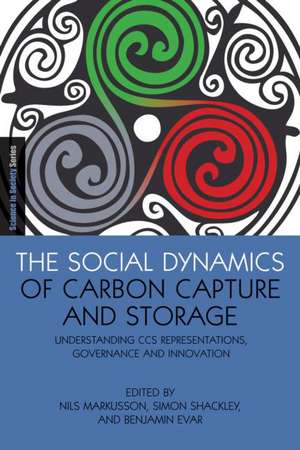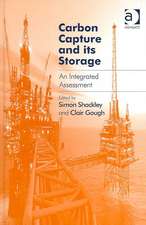The Social Dynamics of Carbon Capture and Storage: Understanding CCS Representations, Governance and Innovation: The Earthscan Science in Society Series
Editat de Nils Markusson, Simon Shackley, Benjamin Evaren Limba Engleză Paperback – mai 2012
| Toate formatele și edițiile | Preț | Express |
|---|---|---|
| Paperback (1) | 424.58 lei 6-8 săpt. | |
| Taylor & Francis – mai 2012 | 424.58 lei 6-8 săpt. | |
| Hardback (1) | 1007.39 lei 6-8 săpt. | |
| Taylor & Francis – mai 2012 | 1007.39 lei 6-8 săpt. |
Din seria The Earthscan Science in Society Series
-
 Preț: 340.38 lei
Preț: 340.38 lei -
 Preț: 340.38 lei
Preț: 340.38 lei -
 Preț: 198.19 lei
Preț: 198.19 lei -
 Preț: 488.29 lei
Preț: 488.29 lei -
 Preț: 382.75 lei
Preț: 382.75 lei -
 Preț: 456.06 lei
Preț: 456.06 lei -
 Preț: 418.67 lei
Preț: 418.67 lei - 18%
 Preț: 1017.91 lei
Preț: 1017.91 lei -
 Preț: 469.34 lei
Preț: 469.34 lei - 21%
 Preț: 378.39 lei
Preț: 378.39 lei -
 Preț: 412.37 lei
Preț: 412.37 lei -
 Preț: 449.41 lei
Preț: 449.41 lei -
 Preț: 469.34 lei
Preț: 469.34 lei - 12%
 Preț: 299.52 lei
Preț: 299.52 lei - 13%
 Preț: 333.12 lei
Preț: 333.12 lei -
 Preț: 416.22 lei
Preț: 416.22 lei -
 Preț: 413.33 lei
Preț: 413.33 lei -
 Preț: 116.59 lei
Preț: 116.59 lei -
 Preț: 411.64 lei
Preț: 411.64 lei - 22%
 Preț: 332.02 lei
Preț: 332.02 lei - 15%
 Preț: 463.46 lei
Preț: 463.46 lei -
 Preț: 444.62 lei
Preț: 444.62 lei - 18%
 Preț: 1001.87 lei
Preț: 1001.87 lei - 18%
 Preț: 1110.77 lei
Preț: 1110.77 lei -
 Preț: 392.24 lei
Preț: 392.24 lei -
 Preț: 390.54 lei
Preț: 390.54 lei -
 Preț: 357.43 lei
Preț: 357.43 lei - 18%
 Preț: 1054.71 lei
Preț: 1054.71 lei -
 Preț: 444.62 lei
Preț: 444.62 lei - 18%
 Preț: 1278.88 lei
Preț: 1278.88 lei - 26%
 Preț: 764.20 lei
Preț: 764.20 lei
Preț: 424.58 lei
Nou
Puncte Express: 637
Preț estimativ în valută:
81.25€ • 84.52$ • 67.08£
81.25€ • 84.52$ • 67.08£
Carte tipărită la comandă
Livrare economică 14-28 aprilie
Preluare comenzi: 021 569.72.76
Specificații
ISBN-13: 9781849713153
ISBN-10: 1849713154
Pagini: 352
Ilustrații: 16
Dimensiuni: 156 x 234 x 19 mm
Greutate: 0.65 kg
Ediția:New.
Editura: Taylor & Francis
Colecția Routledge
Seria The Earthscan Science in Society Series
Locul publicării:Oxford, United Kingdom
ISBN-10: 1849713154
Pagini: 352
Ilustrații: 16
Dimensiuni: 156 x 234 x 19 mm
Greutate: 0.65 kg
Ediția:New.
Editura: Taylor & Francis
Colecția Routledge
Seria The Earthscan Science in Society Series
Locul publicării:Oxford, United Kingdom
Cuprins
1. Introduction. 2. An introduction to key developments and concepts in CCS: history, technology, economics and law. 3. Introduction to section on perceptions and representations. 4 public understanding of and engagement with CCS. 5. Colonising the future: the case of CCS. 6. Beyond ‘For or Against’: environmental NGO-evaluations of CCS as a climate change solution. 7. Introduction to section on governance. 8. The evolving international CCS community. 9. Up and down with CCS: the issue-attention cycle and the political dynamics of decarbonisation. 10. Technology management in the face of scientific uncertainty: a case-study of the CCS Test Centre, Mongstad. 11. Introduction to section on innovation. 12. CCS: a disruptive technology for innovation theory. 13. Learning in CCS demonstration projects: social and political dimensions. 14. Conclusions.
Notă biografică
Nils Markusson has 15 years experience in the area of innovation and technology studies. He currently works as a Research Associate at the Scottish Carbon Capture and Storage research centre on several projects on aspects of CCS innovation.
Simon Shackley works on assessing options for removal and storage of CO2. This includes techno-economic, socio-political and policy evaluations and implications. He first became interested in CCS in 2000 having analysed the potential limitations of carbon mitigation from other leading options.
Benjamin Evar is a PhD student at the Scottish Carbon Capture and Storage research centre at the University of Edinburgh. His research focuses on the emerging governance of carbon capture and storage, and the role of science in policymaking.
Simon Shackley works on assessing options for removal and storage of CO2. This includes techno-economic, socio-political and policy evaluations and implications. He first became interested in CCS in 2000 having analysed the potential limitations of carbon mitigation from other leading options.
Benjamin Evar is a PhD student at the Scottish Carbon Capture and Storage research centre at the University of Edinburgh. His research focuses on the emerging governance of carbon capture and storage, and the role of science in policymaking.
Recenzii
"The book makes a significant contribution to our existing knowledge and provides interested professionals, policymakers and members of the public with a timely overview of the critical issues involved in the societal acceptance of CCS" – Peta Ashworth, Chair of the Social Research Network under the International Energy Agency's Greenhouse Gas R&D Programme
"Would CCS have been in a better state had this book been published in 2005? Probably. Although it is not exhaustive in addressing the social dynamics of CCS, this in itself makes this book worth reading for those interested in climate policy and innovation, but it is obligatory reading for those working on CCS. At the moment, CCS is not on track to play the role that is so badly needed to reduce CO2 emissions from fossil fuel use. If climate policies eventually make CCS a commercial necessity for fossil fuel-based industries, then this book deserves to be re-read. Its knowledge and lessons will allow us to get it right this time." – Heleen de Coninck, Climate Policy
"Would CCS have been in a better state had this book been published in 2005? Probably. Although it is not exhaustive in addressing the social dynamics of CCS, this in itself makes this book worth reading for those interested in climate policy and innovation, but it is obligatory reading for those working on CCS. At the moment, CCS is not on track to play the role that is so badly needed to reduce CO2 emissions from fossil fuel use. If climate policies eventually make CCS a commercial necessity for fossil fuel-based industries, then this book deserves to be re-read. Its knowledge and lessons will allow us to get it right this time." – Heleen de Coninck, Climate Policy






















